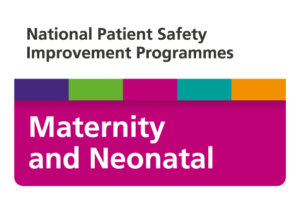Maternity and Neonatal Programme
 About the programme
About the programme
The Maternity and Neonatal programme aims to contribute to the national ambition, set out in Better Births, to reduce the rates of maternal and neonatal deaths, stillbirths and brain injuries that occur during or soon after birth by 50% by 2025.
It aims to contribute to the national ambition, set out in Safer Maternity Care, to reduce the national rate of preterm births from 8% to 6% and improve the safety and outcomes of maternal and neonatal care by reducing unwarranted variation and provide a high-quality healthcare experience for all women, babies, and families across maternity and neonatal care settings in England.
Who we are working with
The Network’s immediate priority is Optimisation and Stabilisation of the Preterm Infant, starting with improving the numbers of babies born in the appropriate care setting for gestation.
As we work closely with the national MatNeo SIP Team, our regional collaboration includes close links with all the Maternity Systems in the region:
- West Yorkshire and Harrogate Local Maternity System
- Humber Coast and Vale Local Maternity Systems
- South Yorkshire and Bassetlaw Local Maternity and Neonatal System
We also work with:
- The Chief Regional Midwife
- The Yorkshire and Humber Maternity Clinical Network
- Yorkshire and Humber Neonatal Operational Delivery Network.
We are also strengthening links with local Maternity Voice Partnerships.
Main deliverables
Ensure the effective optimisation and stabilisation of the preterm infant by embedding a pathway of care encompassing seven evidence-based interventions leading to improved health outcomes
- All 7 key interventions to be implemented, as a pathway approach, in at least 65% of maternity and neonatal providers by March 2023
Ensure the use of the Maternity Early Warning Score (MEWS) tool is embedded within an effective PIER pathway for managing deterioration and support:
- All pilot sites to have undertaken phase 1 testing by June 2022
- All pilot sites to have completed phase 2 testing by September 2022
- A local plan for adoption and spread of the national MEWS
Ensure the use of the New-born Early Warning Trigger and Track (NEWTT2) tool is embedded within an effective PIER pathway for managing deterioration and support:
- All pilot sites to have undertaken phase 1 testing by May 2022
- A local plan for spread of NEWTT2 implementation
Support Maternity and Neonatal teams to improve their safety culture and identify safety culture insights that can be utilised and scaled as part of a future national leadership and culture programme
- Work with local leaders to support a repeat of the national culture surveys
- Work with local leaders to support effective debriefing of clinical teams following culture surveys
How to get involved
Please contact:
- Mel Johnson, Patient Safety Collaborative Programme Manager.
- Jackie Hallam, MatNeoSIP Work Stream Lead
